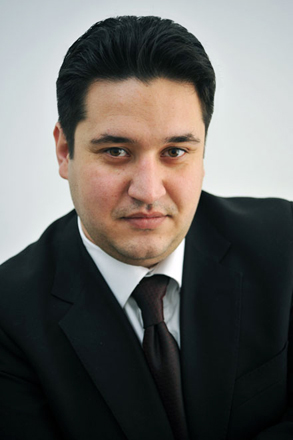Azerbaijan, Baku, Nov. 22 / Trend /
Trend Agency expert Seymur Aliyev
Successful economic development of certain countries of the Caspian region gives no relief to the neighbours, trying to preserve and strengthen political and economic influence in the region.
An independent economic policy of these countries, primarily increases their security and independence whilst making decisions and brings them into the forefront as leaders of the region. Of course, the traditional influential players of the Caspian basin do not like this and this sometimes leads to unusual and often inadequate fantastic statements.
It is no secret that the basis of the economies of all Caspian countries is the energy one. Attempts to influence the implementation of joint projects in this sector and particularly on the Trans-Caspian gas pipeline between Turkmenistan and Azerbaijan are nothing more than a desire to strike a blow for the economy.
One could call the Russian economic experts' last statements about the possibility of military influence on the economy, namely the implementation of the joint gas pipeline project between Azerbaijan and Turkmenistan as marasmus.
Realising that the diplomatic and economic pressures on the project actually failed, individuals opposing its implementation are trying to raise the level of risks for its implementation by their belligerent statements to scare foreign companies away, or increase the cost of its delivery increasing the investment risks.
In fact, Russian experts' statements are like Star Wars. This is the war of science fiction, a good scenario for the next series of the James Bond films.
Earlier, the experts spoke about the Trans-Caspian gas pipeline project as about something unreal in terms of economy. At present, while making fantastic statements about the ways to counteract its implementation, the experts actually confirm not only its reality, but also its prospect.
Kazakh representatives also expressed their position on the Trans-Caspian gas pipeline. The National Company KazMunayGas's chairman Bolat Akchulakov said that we do not deal with this project until the legal status of the Caspian Sea is determined.
Astana's statements primarily come from the lack of sufficient resource base and today Kazakhstan does not have sufficient volumes of gas supplies for this route. One must not forget that Kazakhstan and Azerbaijan regularly discuss the Trans Caspian oil transportation project which may lead to the construction of an underwater oil pipeline in the future.
It should be noted that less statements relating to the environmental component of the Trans-Caspian gas pipeline have been recently voiced. Earlier, Russia acknowledged this when Moscow put into operation the Nord Stream which is the gas pipeline through the Baltic Sea in early November. It has repeatedly talked about the insecurity of laying an underwater gas pipeline in the Caspian Sea.
Bellicose statements to counter the cooperation surrounding the Caspian Sea have been frequently made in connection with the important events within the Trans-Caspian project. This primarily relates to the mandate received by the EU to hold the negotiations on the Trans-Caspian project with Azerbaijan and Turkmenistan. The pipeline is also supported by U.S. and these officials and in particular the U.S Special Envoy for Eurasian Energy Richard Morningstar says that if Brussels, Baku and Ashgabat decide to build a gas pipeline, no one can stop it.
The most important thing is what Turkmenistan says about actual possibility of implementing the project. It will be the main resource base for this project. The country invests huge funds in large scale energy projects. Their implementation serves as a guarantee for the strict observance of the undertaken partnership obligations, Turkmen President Gurbanguly Berdimuhamedov said at a meeting with EU Special Representative for Central Asia Pierre Morel.
He said that Turkmenistan is an active supporter of the new approaches to global energy security. It takes concrete steps to increase its export capacity in this regard. The European direction was and remains one of the main priorities of Turkmenistan's foreign policy.
It should be stressed that both Russia and Iran not only oppose the export of Turkmen gas through the Caspian Sea and Azerbaijan to Europe. They also offer their routes to deliver gas to European markets. This actually confirms that there is struggle for a specific economic goal to get Turkmen gas, rather than the borders on the Caspian Sea. This is the strengthening of the monopoly in the market for Russia and the ability to get out of the situation for the imposed political and economic sanctions on Iran.
Despite the opposition to the project, Azerbaijan has repeatedly confirmed that it is ready to guarantee and allocate its territory, transit opportunities and infrastructure to implement the Trans-Caspian project.
The Trans-Caspian gas pipeline is part of project Nabucco, which is one of the Southern Gas Corridor's projects envisioning Caspian energy export to European markets. It envisages the laying of a 300-kilometre pipeline over the seabed from Turkmenistan to Azerbaijan. Turkmenistan is to bear the main energy burden of the project.
The Southern Gas Corridor is a priority EU energy project diversifying energy supply routes and sources and increasing security. It includes the Nabucco gas pipeline, TAP and ITGI (Turkey-Greece-Italy pipeline).
Turkmenistan with its reserves can claim to be one of key suppliers. Ashgabat's efforts in this direction are visible.
The construction of a 1000 kilometre gas pipeline 'East-West' worth $2 billion was launched.
It aims to link resources of the eastern region of the country - Yoloten and neighbouring fields to the Caspian coast to a single transport network. By laying a 300-kilometre pipeline along the seabed via Azerbaijan and Turkey, it is possible to enter the European market.






